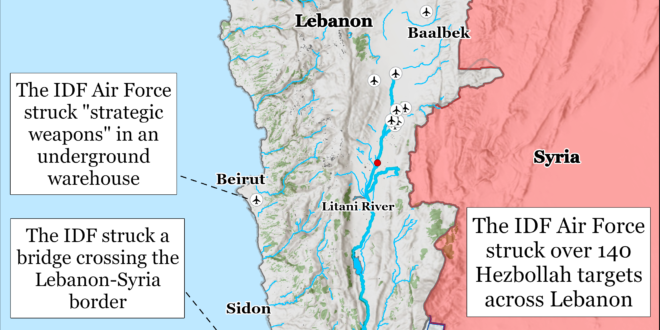The Israel Defense Forces (IDF) continued to seize terrain in several Lebanon towns along the Israel-Lebanon border. Israeli forces have previously seized or partially secured terrain in Maroun al Ras, Yaroun, and Blida in southeastern Lebanon. Geolocated footage and commercial satellite imagery on October 16 show that Israeli forces have recently seized terrain along the western axis of advance in Mhaibib and along the eastern axis of advance in Ramyeh.[ii] A Lebanese social media user confirmed imagery and other reports that the IDF had “taken control” over the two villages.[iii] Israeli forces continued to operate in both areas on October 16.[iv] A force seizes terrain by killing or capturing all enemy forces and preventing the enemy from firing on the area. Israeli forces are likely currently conducting clearing operations in Mhaibib and Ramyeh, as indicated by engagements with Hezbollah fighters and the destruction of Hezbollah infrastructure. Hezbollah fired rockets and anti-tank guided missiles targeting Israeli armor in Ramyeh, and Lebanese media reported heavy exchanges of fire between Israeli forces and Hezbollah fighters in the village on October 16.[vi] The IDF 91st Division destroyed an underground Radwan tunnel complex beneath Mhaibib on October 16 that Radwan forces used as a headquarters.[vii] Israeli forces are seizing and clearing terrain in border towns and areas to prevent Hezbollah direct fire attacks and ground attacks into Israel, supporting the stated Israeli war aim of returning Israeli civilians to the north.
Hezbollah fighters continued to engage Israeli forces in unsecured border areas. Hezbollah fighters and Israeli forces exchanged small arms fire in Qouzah and Aita al Shaab, near Ramyeh, according to Hezbollah-affiliated sources.[viii] Hezbollah also fired rockets targeting Israeli personnel between Markaba and Odaisseh.[ix] A Lebanese social media user noted that Hezbollah continues to control Odaisseh, which is in a small valley that runs east-to-west away from the Israeli border and is overlooked by two steep hills.[x] The IDF operated on the southern hill and engaged Hezbollah fighters there earlier in the war. IDF officers have consistently remarked that their forces are engaging Hezbollah fighters at longer ranges or that Hezbollah fighters have fled altogether, Hezbollah’s Deputy Secretary-General Naim Qassem claimed on October 16 that this is an intentional strategy on Hezbollah’s part and that the group intends to rapidly attack and ambush Israeli forces when they enter Lebanese territory rather than confront them as a regular standing army might.
Israeli Prime Minister Benjamin Netanyahu said on October 15 that Israel would reject any ceasefire that would enable Hezbollah to reorganize and rearm.[xii] Netanyahu told French President Emmanuel Macron that Israel would not accept a ceasefire agreement that would allow for Lebanon’s “security situation” to return to how it was before the IDF’s offensive.[xiii] [xiv] Netanyahu has previously declared that Israel seeks to return its citizens to the north by “defeat[ing] Hezbollah.”[xv] Israeli ground and air operations are presumably designed to defeat Hezbollah by rendering it unable or unwilling to continue the fight, thereby forcing Hezbollah to end its attacks and allowing Israeli citizens to return to the north. The Hezbollah that would emerge from such a war would be severely damaged and unable to execute the activities it traditionally has—at least for a time. Netanyahu’s demands for ceasefire stipulations to prevent Hezbollah from reorganizing and rearming would prevent Hezbollah from continuing to threaten Israel in the long term.
Netanyahu’s demand to prevent Hezbollah’s reorganization and rearmament are provisions that are in part enshrined in UN Resolution 1701. UN Resolution 1701 requires the disarmament of armed groups between the Litani River and the Israel-Lebanon border.[xvi] The UN Interim Force in Lebanon (UNIFIL) is present in southern Lebanon to monitor the implementation of UN Resolution 1701 and to ”take all necessary action” to prevent the area from being used for hostile activities, which would include Hezbollah‘s extensive development of military infrastructure.[xvii] Hezbollah’s investment in military infrastructure in southern Lebanon was designed to be used in future wars against Israel. Several of these Hezbollah positions, including the tunnel complex the 91st Division destroyed in Mhaibib on October 16, were located within a few kilometers of UNIFIL outposts.[xviii]
Israeli media reported that Israel decided on the targets it could “potentially strike” in Iran on October 16.[xix] The IDF presented a list of potential targets to Israeli Prime Minister Benjamin Netanyahu and Defense Minister Yoav Gallant and began finalizing preparations including “sensitive coordination” with other regional countries. The report stated that Israel ”described its general attack plans” to the United States without providing an update on specific targets. An unspecified source stated that Israel could change its targeting decisions “at the 11th hour.”[xx] Unspecified American officials told CNN that they expect Israel will retaliate before the US presidential election on November 5.[xxi]
A senior Iranian defense official downplayed the US decision to send a Terminal High Altitude Area Defense (THAAD) anti-missile system to Israel. Iranian Defense Minister Brigadier General Aziz Nasir Zadeh dismissed this deployment as “psychological warfare” and claimed that the system does not present a “particular problem” for Iran.[xxii] An Islamic Revolutionary Guards Corps-affiliated outlet similarly argued on October 13 that the THAAD system will not be effective against Iranian ballistic missiles, including the Fatah missile used in Iran’s October 1 attack.[xxiii] The American-made THAAD system is ”highly effective” and ”combat-proven” against short, medium, and intermediate-range ballistic missiles, according to US manufacturer Lockheed Martin.[xxiv] The THAAD system successfully intercepted Houthi ballistic missiles targeting the United Arab Emirates in 2022.[xxv]
An unspecified “informed” source told Iraqi news outlet Baghdad Today that an American delegation arrived in Baghdad unannounced on October 16 to prepare for “indirect negotiations” with Iran.[xxvi] The source claimed that Washington has pressured Iraqi mediators to open negotiations with Iran amid concerns of potential regional escalation.[xxvii] The source also claimed that members of the US delegation are holding meetings with “elite” Iraqis on an ongoing basis to advance negotiations. These reports come as Iranian officials have been conducting “urgent diplomacy” with Middle Eastern countries to try to reduce the scale of Israel’s retaliation.[xxviii] Senior Israeli officials guaranteed senior American officials that Israel will target Iranian military and defense sites instead of nuclear or oil facilities in its retaliatory strike on Iran.[xxix]
Iranian Foreign Affairs Minister Abbas Araghchi continued his diplomatic tour of Middle Eastern countries to persuade their leaders to bar Israel from using their airspace in Israel’s retaliation against Iran.[xxx] Araghchi met with the Jordanian King Abdullah II and the Jordanian Foreign Minister and Deputy Prime Minister Ayman Safadi separately in Amman on October 16 to discuss ceasefires in Gaza and Lebanon, humanitarian aid, and Israel‘s retaliation against Iran[xxxi] Safadi reiterated that Jordan will not allow Jordanian airspace to be violated.[xxxii] Iran’s two attacks on Israel on April 13 and October 1 resulted in many Iranian projectiles violating Jordanian airspace.[xxxiii] Jordan is not to prevent Israel from launching an attack over Jordanian airspacKing Abdullah II also met with a US House of Representatives Armed Services Committee delegation led by Representative Mike Rogers in Amman on October 15.[xxxiv] This committee is responsible for designating funds for the US defense authorization bill, including financial assistance abroad.[xxxv] Jordan receives financial assistance money through the defense authorization bill. Araghchi will similarly meet Egyptian officials in Cairo on October 17.[xxxvi] Araghchi will attend the 3+3 Summit in Istanbul on October 18, where he will meet with Russian, Turkish, Azerbaijani, and Armenian officials.[xxxvii]
Iranian Parliamentarian Ali Asghar Nakhaei Rad urged the Supreme National Security Council (SNSC) to ask Khamenei to reconsider his 2003 fatwa banning nuclear .[xxxviii] Nakhaei Rad emphasized that “time and place” affects fatwas and “Shia jurisprudence is dynamic,” suggesting that current regional conditions could justify a shift in Iran’s nuclear doctrine. Nakhaei Rad was among the thirty-nine Iranian parliamentarians who signed a letter to the SNSC calling for a revision of Iranian “defense doctrine” and for the SNSC to “issue permission and provide facilities for the production of nuclear weapons.”[xxxix] CTP-ISW previously assessed that the letter was likely sent to the SNSC to encourage them to persuade Khamenei to reconsider his fatwa, as he has ultimate authority to revoke it.[xl]
US officials are considering improving and endorsing a UAE-proposed post-war plan for the Gaza Strip after the US presidential election. Axios reported on October 16 that the Israeli strategic affairs minister and Emirati foreign affairs minister met with US Secretary of State Antony Blinken to discuss a UAE-proposed plan for the Gaza Strip after the war.[xli] Blinken is now reportedly considering this plan, having concluded that there is “no deal in sight” for a hostage release and ceasefire deal between Hamas and Israel. The UAE plan, which was initially laid out in July 2024, would include the deployment of a temporary international mission to the Gaza Strip that would ”deliver humanitarian aid, establish law and order, and lay the groundwork for governance in the Strip.”[xlii] Part of the UAE’s plan involves appointing a reformed Palestinian Authority led by an independent prime minister to govern the post-war Gaza Strip.[xliii] The Palestinian Authority dismissed the UAE proposal because it is in conflict with the Chinese-mediated Hamas-Fatah deal that would establish a ”national unity government” including Hamas that would govern both the Gaza Strip and the West Bank.[xliv] The United States views UAE’s plan as a potential alternative that aims to lay out a possible path forward to the post-war governance structure for the Gaza Strip.
Key Takeaways:
- Israeli Ground Operations in Lebanon: The Israel Defense Forces (IDF) continued to seize terrain in several Lebanon towns along the Israel-Lebanon border. Hezbollah fighters continued to engage Israeli forces in unsecured border areas.
- Israeli Policy in Lebanon: Israeli Prime Minister Benjamin Netanyahu said on October 15 that Israel would reject any ceasefire that would enable Hezbollah to reorganize and rearm. Netanyahu’s demand to prevent Hezbollah’s reorganization and rearmament are provisions that are in part enshrined in UN Resolution 1701. The UN Interim Force in Lebanon (UNIFIL) is present in southern Lebanon to monitor the implementation of UN Resolution 1701 and to ”take all necessary action” to prevent the area from being used for hostile activities, which would include Hezbollah‘s extensive development of military infrastructure.
- Israeli Retaliation Against Iran: Israeli media reported that Israel decided on the targets it could “potentially strike” in Iran on October 16. Iranian Foreign Affairs Minister Abbas Araghchi continued his diplomatic tour of Middle Eastern countries to persuade their leaders to bar Israel from using their airspace in Israel’s retaliation against Iran.
- Iranian Nuclear Policy: Iranian Parliamentarian Ali Asghar Nakhaei Rad urged the Supreme National Security Council (SNSC) to ask Khamenei to reconsider his 2003 fatwa banning nuclear . Nakhaei Rad was among the thirty-nine Iranian parliamentarians who signed a letter to the SNSC calling for a revision of Iranian “defense doctrine” and for the SNSC to “issue permission and provide facilities for the production of nuclear weapons.”
- Postwar Plans in the Gaza Strip: US officials are considering improving and endorsing a UAE-proposed post-war plan for the Gaza Strip after the US presidential election. US officials are now reportedly considering this plan, having concluded that there is “no deal in sight” for a hostage release and ceasefire deal between Hamas and Israel.
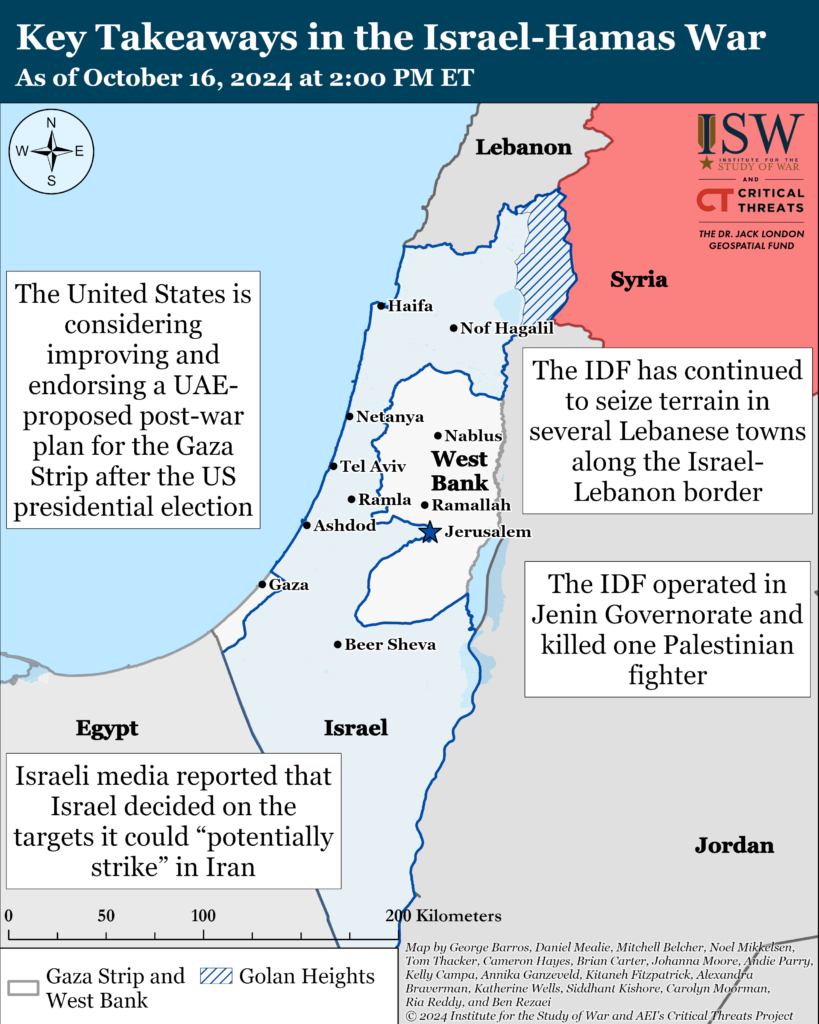
Gaza Strip
Axis of Resistance objectives:
Erode the will of the Israeli political establishment and public to sustain clearing operations in the Gaza Strip
Reestablish Hamas as the governing authority in the Gaza Strip
The 162nd IDF Division continued clearing operations in Jabalia, northern Gaza Strip, on October 16. The IDF killed an unspecified number of Palestinian fighters in Jabalia.[xlv] The IDF also conducted airstrikes targeting Palestinian fighters in Jabalia.[xlvi] The IDF Air Force conducted an airstrike and killed Hamas’ drone unit commander Mahmoud al Mabhouh in the northern Gaza Strip.[xlvii] The IDF stated that al Mabhough was responsible for conducting drone attacks from the Gaza Strip into Israel.[xlviii] Palestinian militias continued to engage Israeli forces in Jabalia since CTP-ISW’s last data cut-off on October 15. Palestinian militias conducted at least six attacks targeting Israeli forces in Jabalia.[xlix] Palestinian Islamic Jihad (PIJ) and Hamas targeted three Israeli Merkava tanks by detonating improvised explosive devices (IEDs) and firing rocket-propelled grenades (RPGs) in the al Qassasib neighborhood, in Jabalia refugee camp.[l] Hamas also detonated IEDs targeting an IDF infantry unit operating inside a building in Jabalia City and then detonated an anti-personnel mine targeting an IDF force sent to evacuate IDF wounded.[li] The al Aqsa Martyrs’ Brigades engaged Israeli forces operating in Jabalia refugee camp by firing small arms.
Palestinian militias conducted at least three attacks targeting Israeli forces north of Gaza City on October 16. [liii]
The al Aqsa Martyrs’ Brigades conducted a rocket attack targeting Israeli forces along the Netzarim Corridor on October 16.[liv]
The IDF 143rd Division directed a drone strike targeting a Palestinian militia cell in Rafah on October 16.[lv] The IDF said that the militia cell was planning to conduct a terrorist attack targeting Israeli forces in the region.
Palestinian militias conducted at least two attacks targeting Israeli forces in Rafah on October 16.[lvi] Hamas fired an RPG at an Israeli bulldozer in Rafah.[lvii] The National Resistance Brigades fired rockets targeting Israeli forces near the Rafah Crossing.[lviii]
Israel facilitated the transfer of 50 trucks of humanitarian aid provided by Jordan into the northern Gaza Strip on October 16.[lix] reported that Israeli Prime Minister Benjamin Netanyahu convened an emergency meeting on October 16 to discuss expanding humanitarian aid to Gaza.[lx] These developments come after the United States sent a letter to senior Israeli officials on October 13 warning that the Biden administration will be forced to take unspecified steps, including withholding military assistance to Israel, if aid is not delivered to non-combatants in the Gaza Strip.[lxi]
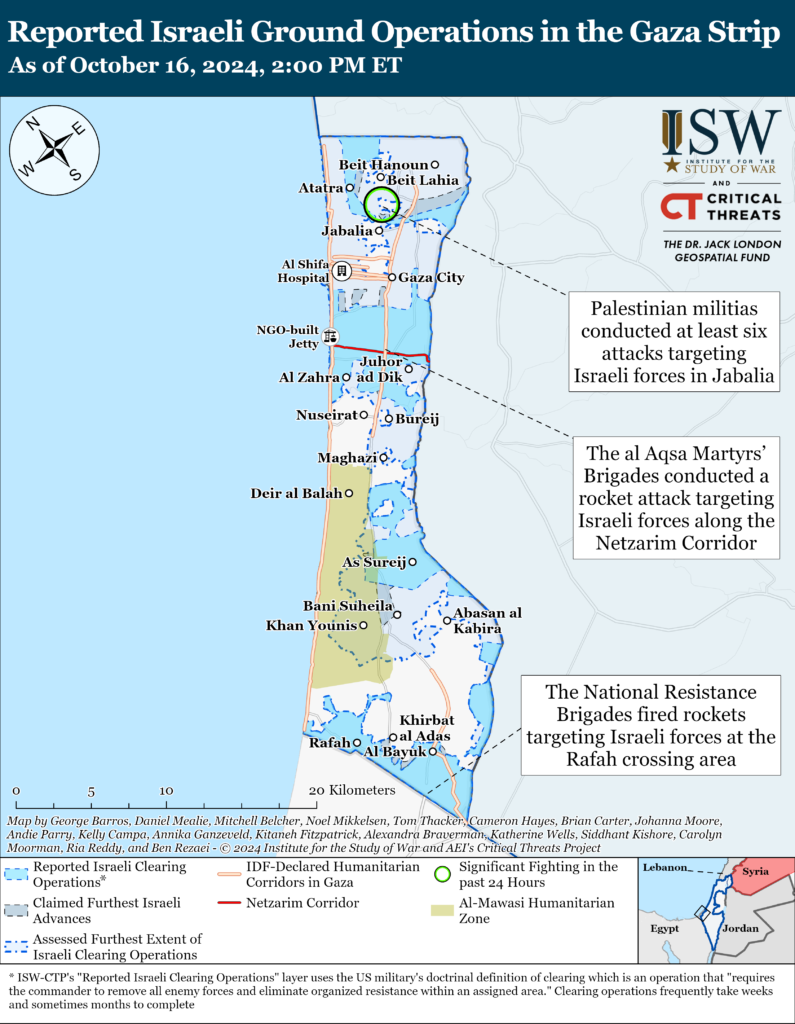
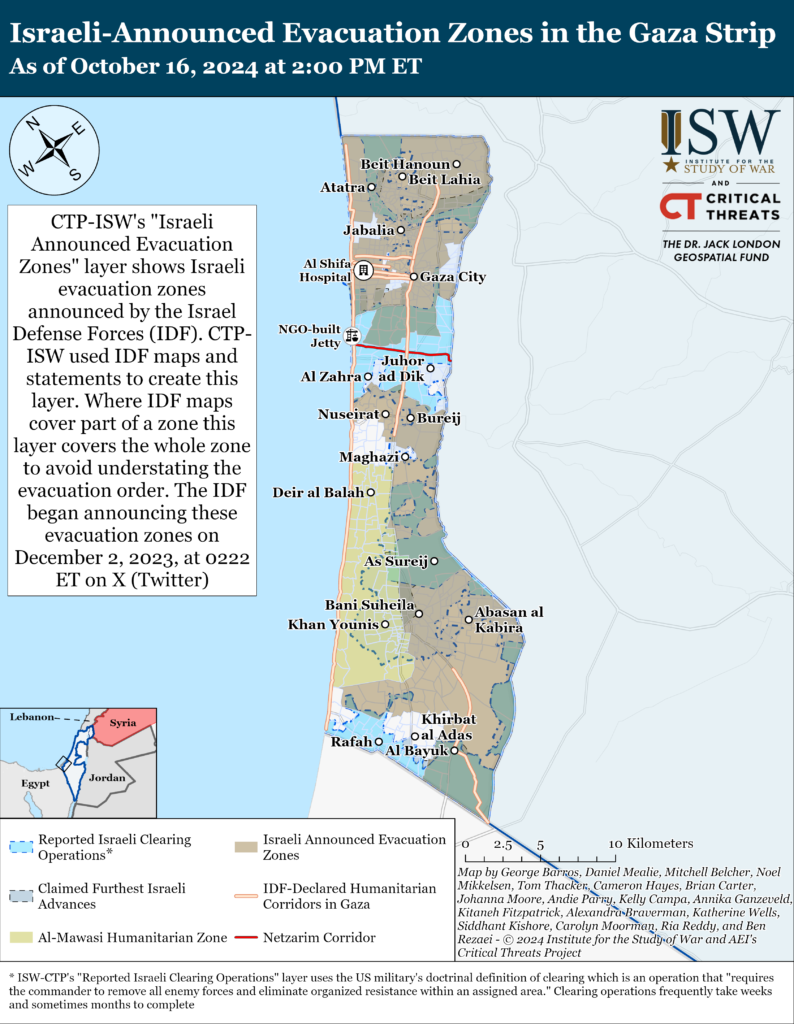
Palestinian militias conducted three indirect fire attacks targeting southern Israel on October 16.[lxii] PIJ launched rockets targeting Sderot and Nir Am.[lxiii] The National Resistance Brigades and the Popular Resistance Committees fired rockets targeting Mefalsim.[lxiv] The IDF intercepted a projectile fired from the northern Gaza Strip towards southern Israel.[lxv]
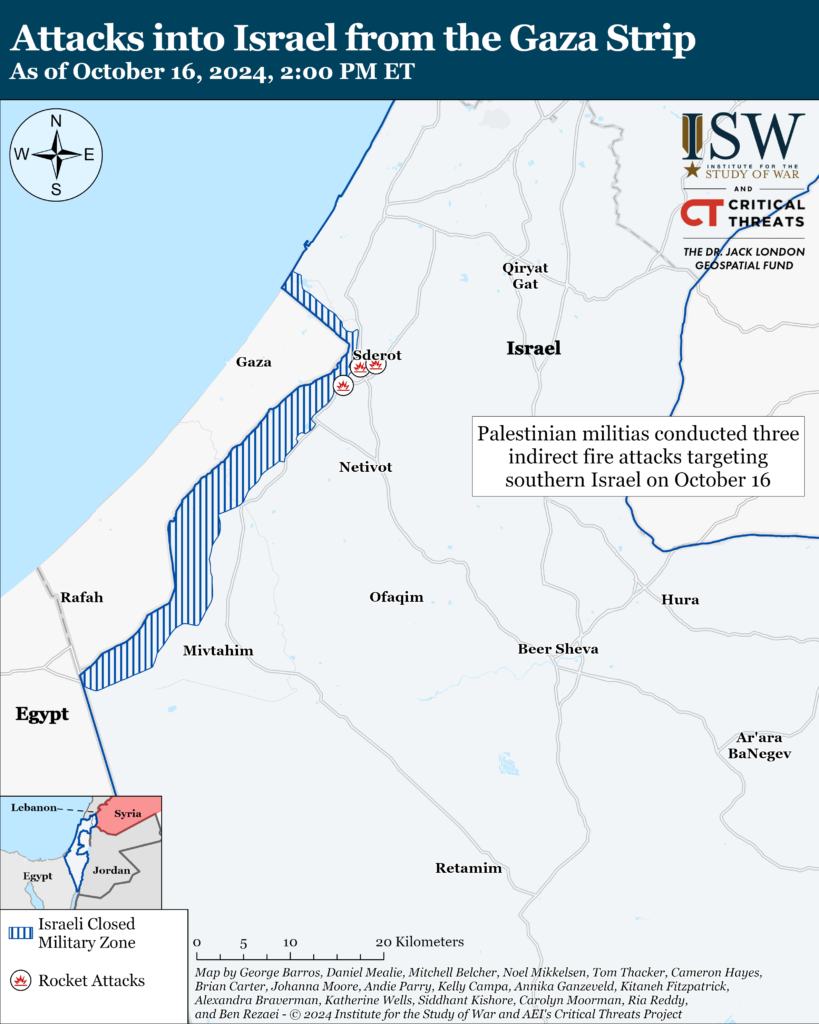
West Bank
Axis of Resistance objectives:
Establish the West Bank as a viable front against Israel
The IDF detained an unidentified armed individual along the Israel-West Bank boundary near the Israeli settlement of Reihan on October 15.[lxvi] The IDF recovered a handgun and an M16 rifle from the detainee. The IDF operated in Jenin Governorate and killed one Palestinian fighter on October 15.[lxvii] The IDF stated that the fighter opened fire targeting Israeli forces to avoid detention. The IDF killed the fighter in return fire, however. The IDF said that the fighter was planning to conduct an attack very soon.[lxviii]
Israeli forces engaged Palestinian fighters in at least five locations in the West Bank since CTP-ISW’s last data cutoff on October 15.[lxix] The al Aqsa Martyrs’ Brigades, Palestinian Islamic Jihad (PIJ), and the Palestinian Mujahideen Movement fired small arms and detonated IEDs targeting Israeli forces operating in the Jenin refugee camp.[lxx] The al Aqsa Martyrs’ Brigades also engaged the IDF in Askar refugee camp, Nablus, and Tubas.[lxxi] The al Aqsa Martyrs separately fired small arms targeting the IDF’s Qalandia checkpoint, north of Jerusalem.[lxxii]
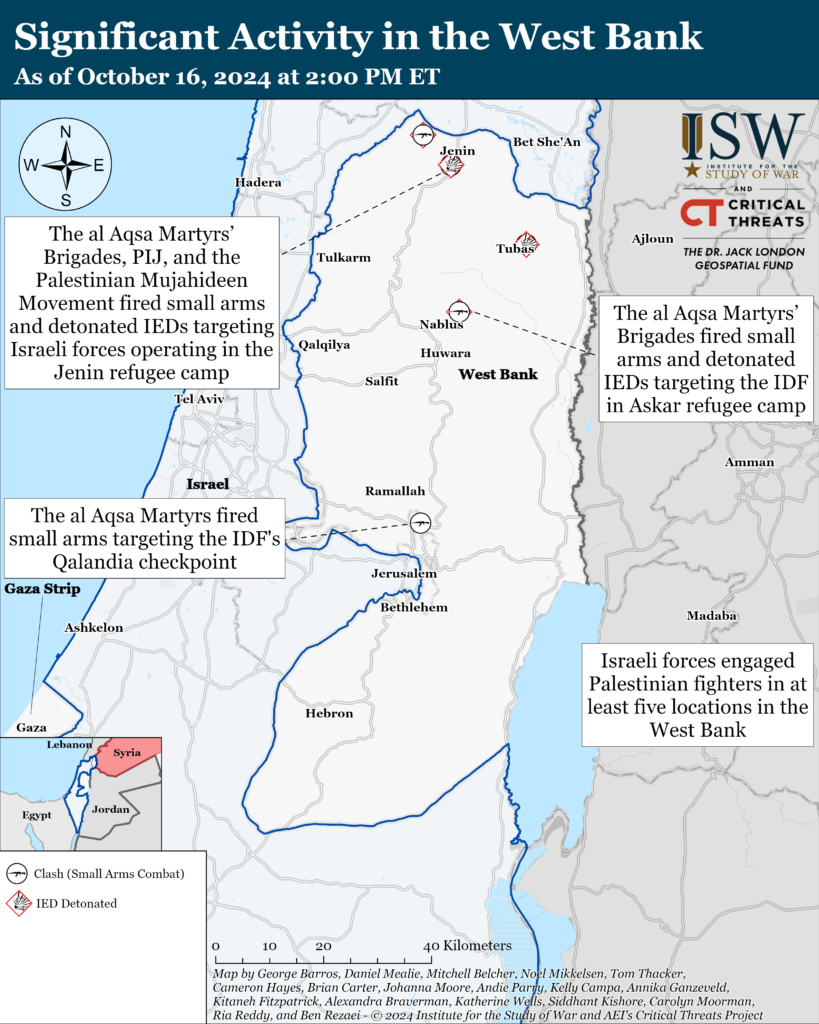
This map is not an exhaustive depiction of clashes and demonstrations in the West Bank.
Northern Israel and Lebanon
Axis of Resistance objectives:
Prepare for an expanded and protracted conflict with Israel in the near term
Expel the United States from Syria
The IDF 98th Division continued clearing operations in unspecified villages in southern Lebanon.[lxxiii] Israeli forces continued to kill Hezbollah fighters and destroy Hezbollah weapons and infrastructure located above and below ground.[lxxiv] Hezbollah fighters fired rockets and mortars targeting Israeli forces near Odaisseh and Markaba.[lxxv] The 98th Division began operating in Odaisseh on October 1, but Hezbollah-affiliated sources reported that Israeli forces withdrew from Odaisseh on October 7.[lxxvi] CTP-ISW has observed clashes between the IDF and Hezbollah forces in the area since October 14.[lxxvii]
The IDF 91st Division continued clearing operations in Mhaibib, southeast Lebanon, on October 16. The IDF 8th Armored Brigade and Yahalom combat engineers located and destroyed a Radwan SOF headquarters complex underneath civilian structures in Mhaibib. The IDF said that Radwan SOF intended to use this complex in the event of a ground invasion into northern Israel.[lxxx] The complex was located opposite the northern Israeli town of Kiryat Shmona and the Ramim Ridge area. Israeli Army Radio said that the complex contained residences, communications systems, and hundreds of weapons, including explosives, anti-tank mines, RPGs, advanced shoulder-fired and anti-tank missiles, and hand grenades.[lxxxii] The 91st Division has killed Hezbollah fighters in and around Mhaibib and located weapons depots, advanced surveillance devices, and other underground infrastructure.[lxxxiii] The 91st Division also identified Hezbollah fighters who had fired at Israeli forces and directed an airstrike that killed the fighters.[lxxxiv]
The IDF 36th Division continued operations in .[lxxxv] The IDF 1st Infantry Brigade conducted “targeted ground operations” in Aita al Shaab on October 16.[lxxxvi] Israeli forces killed dozens of Hezbollah fighters and located two warehouses in civilian areas that contained Kornet ATGMs, Sagar ATGMs, and over 100 mortar rounds.[lxxxvii] The 1st Infantry Brigade and Yahalom combat engineers located four tunnel shafts that were used by Hezbollah fighters as weapons stockpiles. Israeli forces directed airstrikes targeting fighters who fired anti-tank rounds and rocket-propelled grenades at Israeli forces.[lxxxviii] Geolocated footage also showed Israeli forces operating in Ramyeh.[lxxxix] Hezbollah’s attacks on Israeli forces in the area are also described in the topline.
The IDF Navy has supported Israeli ground movements since October 8.[xc] The IDF Navy has attacked dozens of Hezbollah targets in southwestern Lebanon since the IDF 146th Division began ground operations on October 8.[xci] IDF Navy vessels have attacked launchers, military buildings, and ammunition depots.[xcii]
Reuters reported on October 16 that Iranian-backed Syrian and Iraqi groups withdrew from Syria’s border with the due to the presence of Israeli armor and construction vehicles in the demilitarized zone.[xciii] A local Syrian journalist reported that two Israeli tanks crossed the Golan Heights-Syria border on October 14 to protect bulldozers completing the Sufa Road project.[xciv] Syrian sources have reported that Israel began constructing the Sufa Road in 2023, which runs from northern Quneitra to the west of Daraa in the Yarmouk Basin region.[xcv] Syrian media claimed that four Israeli tanks, excavators, and about 50 IDF personnel have been operating within the demilitarized zone near al Asbah and al Rafid in Quneitra Province since October 14.[xcvi] Syrian media also reported that Israeli forces began de-mining areas between the Golan Heights and Shebaa Farms area on October 16.[xcvii] A UN peacekeeping official told Reuters that the UN Disengagement Observer Force (UNDOF) had “recently observed some construction activity being carried out by Israeli military forces in the vicinity of the area of separation.”[xcviii] An unspecified Syrian Arab Army (SAA) officer told Reuters that the SAA ordered Syrian groups to ”pull back” from the southern Quneitra region within 24 hours. Two unspecified sources from Iranian-backed Iraqi groups said that their fighters were also ordered to withdraw from the area.[xcix] Iranian-backed Iraqi forces were reportedly told not to engage the Israeli vehicles directly.[c]
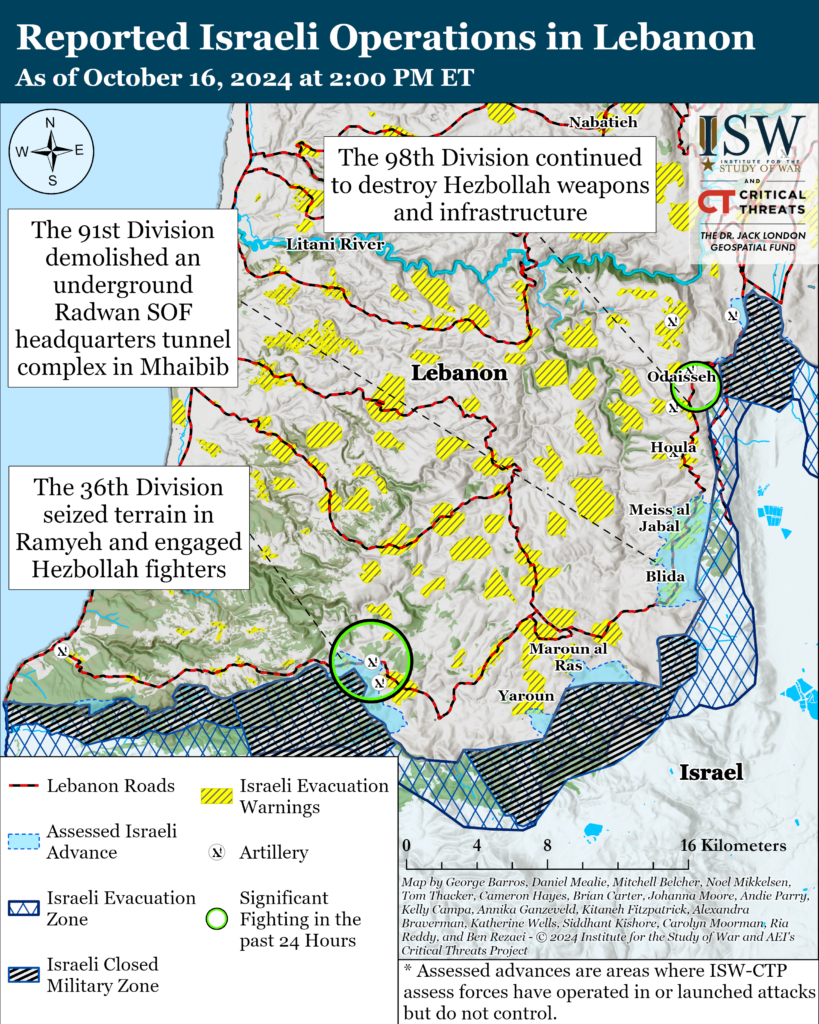
The IDF continued an air campaign to degrade Hezbollah’s capabilities and leadership on October 16. The IDF Air Force struck over 140 Hezbollah targets in over 50 areas of Lebanon under the direction of Northern Command, including weapons depots, launchers aimed at Israeli territory, military buildings, and fighter cells.[ci]
The IDF Air Force killed Hezbollah’s Qana sector commander Jalal Mustafa Hariri on October 16.[cii] Hariri was responsible for planning and executing attacks into Israeli territory from the Qana sector.[ciii] The IDF also killed the artillery chief and anti-tank commander for the Qana sector in the same attack.[civ]
The IDF Air Force conducted the first strike against a Hezbollah target in Beirut in six days. The IDF Air Force struck an underground “strategic weapons” storage facility in southern Beirut.[cv] The IDF issued a warning to civilians to evacuate the area to reduce civilian casualties.[cvi] This airstrike comes amid tensions between the United States and Israel over the latter’s airstrike campaign in Beirut. US State Department Spokesperson Mathew Miller stated that the United States had concerns about the scope and nature of Israel’s airstrike campaign in Beirut in recent weeks. He added that the administration recognizes there are ”specific” strikes that would be appropriate to carry out.
The IDF Air Force conducted airstrikes on “dozens” of Hezbollah military targets around Nabatieh including military buildings, warehouses, and weapons storage.[cviii] The IDF reported that Hezbollah placed many of these facilities near civilian structures. officials reported that the IDF airstrikes struck the Nabatieh city headquarters during a crisis committee meeting and killed 16 and wounded 52 others.[cix] The Nabatieh city mayor was killed in the airstrike.[cx]
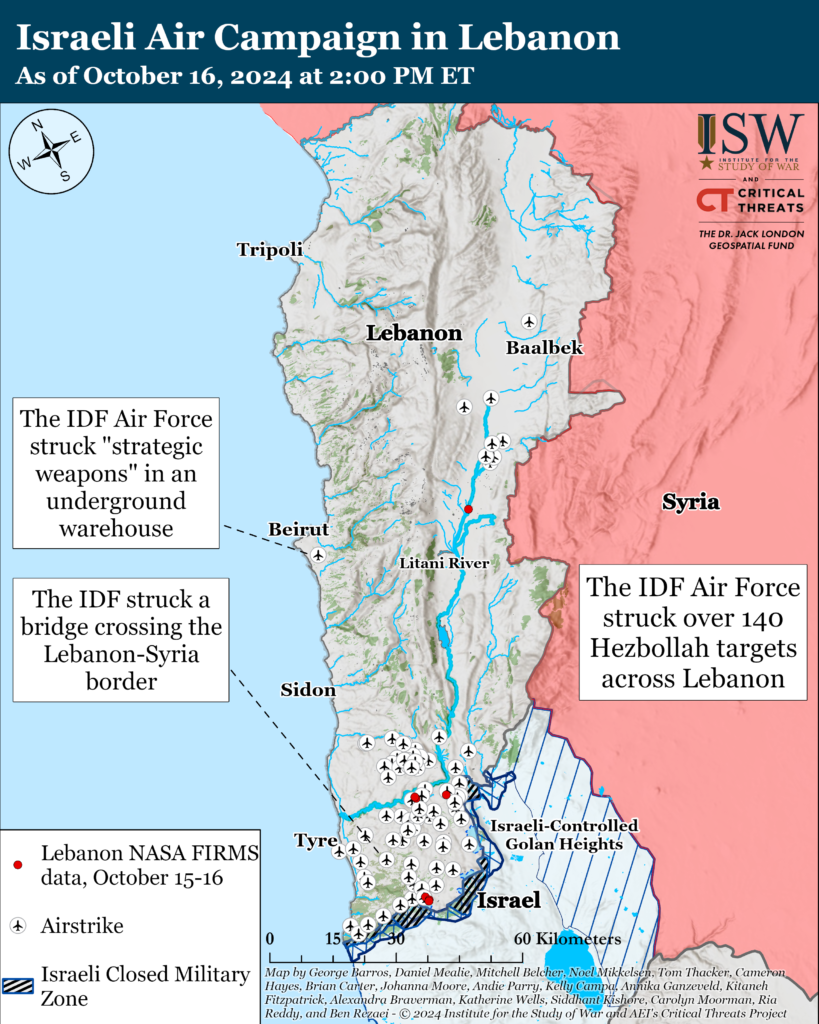
This map illustrates individual Israeli air and artillery strikes based on local Lebanese reporting. This map depicts strikes reported from 2:00pm ET on October 15 to 2:00pm ET on October 16. This map is not exhaustive. CTP-ISW cannot independently verify the locations of Israeli strikes.
Hezbollah has conducted at least 14 attacks into Israel since CTP-ISW’s last data cutoff on October 15. Hezbollah conducted three rocket attacks targeting Israeli artillery positions in Dalton and Dishon, northeastern Israel.[cxi] Hezbollah claimed that its fighters continue to target IDF rear positions in northern Israel and “support lines” as part of its defense against Israel’s ground operation in southern Lebanon.[cxii] Attacks on IDF support elements are meant to degrade the IDF’s ability to conduct effective ground operations. CTP-ISW has recorded Hezbollah attacks on IDF military targets along the Israel-Lebanon border but has not observed any effect on Israeli ground operations.
The IDF detected over 80 indirect fire launches from Lebanon into IsraeThe IDF detected 50 rockets launched by Hezbollah towards Safed, which hosts headquarters for IDF Northern Command.[cxiii] Some rockets were intercepted by Israeli air defense while others fell in the area and damaged one building.[cxiv] The IDF detected a separate salvo of 30 rockets launched from Lebanon into the Upper, Central, and Western .[cxv] Israeli Army Radio reported that ”dozens” of rockets hit the Karmiel area, northern Israel, injuring four individuals.[cxvi]
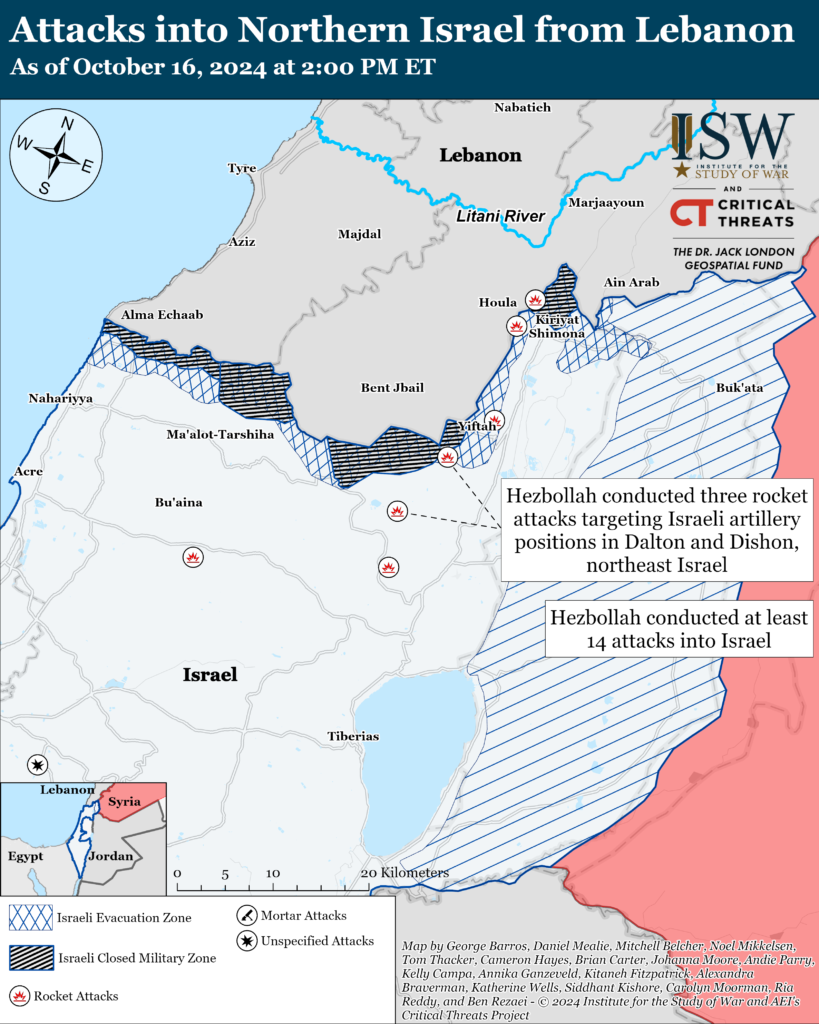
The US State Department and the US Treasury’s Office of Foreign Assets Control (OFAC) sanctioned a total of ten entities engaged in providing financial support to Hezbollah and the Assad regime on October 16.[cxvii] Seven of the sanctioned entities engaged in a Lebanon-based sanction evasion network that was responsible for creating and operating Hezbollah’s commercial projects in Lebanon. Iran financed and facilitated some of these projects.[cxviii] OFAC also sanctioned three individuals involved in the illegal production and trafficking of Captagon, which financially benefits Hezbollah, the Assad regime, and their allies.[cxix] The sanction evasion network and illegal trade of Captagon have generated millions of dollars in revenue for Hezbollah and the Assad regime and have funded their operations.[cxx] The new sanctions on the following entities are part of the Treasury’s efforts against Hezbollah’s financial operations:[cxxi]
Lebanese national Silvana Atwi, secretary of senior finance team official Muhammad Qasim al Bazzal
Lebanese national Haidar Houssam al Din Abdul Ghaffar, a Hezbollah finance team official
Lebanese national Houssam Hamadi, businessman and Hezbollah Financial Associate,
Syria-based, Lebanese national Khaldoun Hamieh, a Hezbollah-affiliated drug trafficker and close associate of Maher al Assad
Syrian national Raji Falhout, associated with the Syrian Military Intelligence Directorate and Hezbollah
Syrian national Adbellatif Hamideh, businessman and drug trafficker associated with the Syrian Military Intelligence Directorate and Hezbollah
M. Farm, Atwi’s business, has served as a signatory on Lebanese financial projects run by Hezbollah and Iran
Global Tradeline SARL, Ghaffar’s business, responsible for importing, rebranding, and selling food products
Liban Oui SARL, Ghaffar’s business, responsible for dairy production operations within Hezbollah’s financial network
United Sons, Houssam Hamadi’s business based in Lebanon
Iran and the Axis of Resistance
Iranian Supreme Leader Ali Khamenei appointed Seyyed Mostafa Hosseini as the Friday Prayer Leader and the representative of the Supreme Leader in Zanjan province on October 16.[cxxii] The representative of the Supreme Leader is given significant authority to issue orders, and if these orders stay within the powers given by the Supreme Leader, these orders must be followed.[cxxiii]
Iranian Foreign Affairs Minister Abbas Araghchi continued to hold phone calls with international leaders on October 16 to discuss Israeli operations in Lebanon. Araghchi emphasized the need to halt during his phone call with French Foreign Affairs Minister Jean-Noël Barrot.[cxxiv] Araghchi held a phone call with UN Secretary-General Antonio Guterres to discuss sending humanitarian aid to the Gaza Strip and Lebanon.[cxxv] Guterres expressed concern for regional escalation and stated that UN peacekeeping forces will remain deployed in southern Lebanon, which is consistent with messaging from EU countries contributing to UNIFIL.[cxxvi]
Iranian President Masoud Pezeshkian called for Muslim countries to adopt a unified stance against Israel in a phone call with Omani Sultan Haitham bin Tariq al Said on October 16.[cxxvii] Pezeshkian stated that a unified stance would make Western support for Israel, including support from the United States, difficult to sustain. The call comes amid an increase in Iranian diplomatic efforts with Middle Eastern countries aimed at reducing the scale of Israel’s retaliation for Tehran’s October 1 missile attack. This includes a visit by Iranian Foreign Affairs Minister Abbas Araghchi to Muscat, Oman, on October 13, where he informed reporters that Iran had stopped its indirect talks with the United States, likely referring to indirect talks that US and Iranian officials have held in Oman in recent months to try to avoid escalation in the region.[cxxviii]
 Eurasia Press & News
Eurasia Press & News
